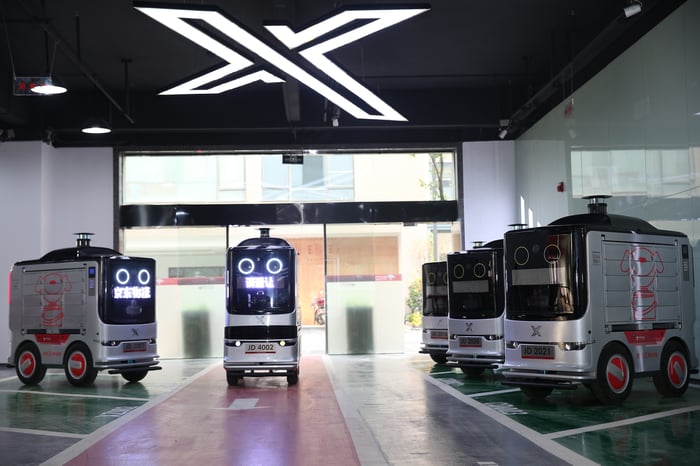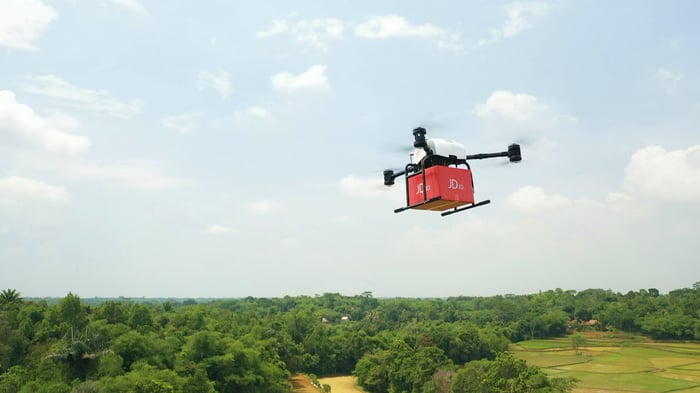JD.com (JD -0.74%), China's largest direct retailer, recently partnered with Japanese e-commerce giant Rakuten (RKUNY 7.44%) to launch an unmanned delivery service in Japan. The service will use JD's autonomous delivery vehicles and drones, which are already operating in China, to help Rakuten cut costs for "last mile" deliveries between transportation hubs and final destinations.
JD's unmanned ground vehicle, which has a top speed of 9 miles per hour, is only about 5 feet tall and less than 6 feet long. Its drone, which can travel up to 10 miles, is less than 2 feet high and weighs about 11 pounds.

JD's delivery vehicles. Image source: JD.
Rakuten has been testing short-distance drone deliveries since 2016, and unmanned ground deliveries since last year. The Japanese government relaxed rules on unmanned drone deliveries last September, and started allowing flights to continue beyond the sight of an operator. This opens the door for longer-distance commercial drone deliveries, which could significantly reduce the need for human couriers.
The team-up could be a win-win deal for JD and Rakuten. It could also give the latter an edge against Amazon.com (AMZN 0.01%), which holds a slim lead over Rakuten in Japan's e-commerce market. Amazon has been testing out its Prime Air drone deliveries since 2016, but it hasn't disclosed any detailed plans for the Japanese market yet.
Why this deal could help JD and Rakuten
JD faced three major headwinds over the past year: decelerating sales growth, which was caused by softer demand for big-ticket electronics and appliances; slower growth in active customers; and contracting operating margins, caused by the expansion of its e-commerce ecosystem and first-party logistics network.
The bears think that JD's capital-intensive business model is unsustainable. But the bulls believe that those investments -- particularly in autonomous warehouse robots, delivery vehicles, and drones -- will pay off and boost its operating margins over the long term.
JD also recently started offering its logistics services to other companies, which could eventually diversify its top line away from its core JD Mall business. Offering its vehicle and drone services to Rakuten complements that strategy.
One of Rakuten's top priorities is to expand the coverage area of its 24-hour Rakuten Express (Rakubin) service, which delivers products in as little as 20 minutes. Between Nov. 2017 and Feb. 2019, Rakuten expanded that service's coverage area from 2% to 19% of Japan. JD's vehicles and drones could help Rakuten quickly expand that reach.

A JD delivery drone. Image source: JD.
Rakuten's revenue rose 17% annually in 2018, but its non-GAAP operating income fell 4%. Its domestic e-commerce business posted an 18% drop in operating profits, indicating that it was waging a costly war against Amazon Japan. Therefore, the use of autonomous vehicles and drones could significantly cut its costs over the long term and help it stay a few steps ahead of Amazon.
Should Amazon be concerned?
Amazon's revenue from Japan, its fourth largest market, rose 16% in 2018 and accounted for 5% of its top line. Amazon surpassed Rakuten over the past decade, and it reinforced that lead with Amazon Prime, its expanding slate of Japanese content for Prime Video, and Echo devices.
Amazon doesn't disclose its operating profits in Japan separately, but its international segment posted an operating loss of $2.1 billion in 2018 -- compared to an operating loss of $3.1 billion in 2017. This indicates that Amazon isn't shy about taking losses to expand its reach into high-growth overseas markets; costly next-gen logistics solutions like drones, vehicles, and autonomous robots could boost those expenses.
However, Amazon has a core strength that JD and Rakuten lack: Amazon Web Services (AWS), the biggest cloud infrastructure platform in the world. AWS is a high-margin business and generated $7.3 billion in operating profits (59% of Amazon's total operating income) in 2018.
The growth of that business enables Amazon to pursue lower-margin and loss-leading strategies in markets like Japan. So JD and Rakuten might gain a head start in the next-gen logistics market, but Amazon won't hesitate to follow that lead with Prime Air.
The bottom line
JD and Rakuten's partnership is mutually beneficial, but it probably won't give Rakuten a meaningful advantage against Amazon. JD could benefit more from the deal, since it's a big vote of confidence for JD Logistics as a stand-alone business, but it won't boost its sales anytime soon.





